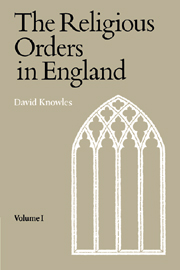Book contents
- Frontmatter
- Contents
- PREFACE
- LIST OF ABBREVIATIONS
- Part One The Old Orders, 1216—1340
- Part Two The Friars, 1216–1340
- Chap. XI The Friars Minor
- Chap. XII The coming of the Minors
- Chap. XIII The order of Preachers
- Chap. XIV The Preachers in England
- Chap. XV The evolution of the Franciscan ideal
- Chap. XVI The apostolic work of the Friars
- Chap. XVII Carmelites, Austin Hermits and lesser orders
- Chap. XVIII The early English Franciscan scholastics
- Chap. XIX Doctrinal and moral controversies: Kilwardby and Pecham
- Chap. XX The Friars from the Council of Lyons to William of Ockham (1272–1340)
- Part Three The Monasteries and their World
- Appendices
- Bibliography
- Index
Chap. XIV - The Preachers in England
Published online by Cambridge University Press: 03 December 2009
- Frontmatter
- Contents
- PREFACE
- LIST OF ABBREVIATIONS
- Part One The Old Orders, 1216—1340
- Part Two The Friars, 1216–1340
- Chap. XI The Friars Minor
- Chap. XII The coming of the Minors
- Chap. XIII The order of Preachers
- Chap. XIV The Preachers in England
- Chap. XV The evolution of the Franciscan ideal
- Chap. XVI The apostolic work of the Friars
- Chap. XVII Carmelites, Austin Hermits and lesser orders
- Chap. XVIII The early English Franciscan scholastics
- Chap. XIX Doctrinal and moral controversies: Kilwardby and Pecham
- Chap. XX The Friars from the Council of Lyons to William of Ockham (1272–1340)
- Part Three The Monasteries and their World
- Appendices
- Bibliography
- Index
Summary
It is a remarkable fact that in almost every centre of new religious life in Europe between 1066 and 1250 there may be found an Englishman. Stephen Harding was a leader at Molesmes and Citeaux; William, later of Rievaulx, was among the first disciples of St Bernard; another William of England was, if not the first, at least one of the most fervent and faithful of Francis's companions at Assisi; and, as we shall see, a singularly elusive Englishman was at the heart of the movement that led to the establishment of the Carmelite friars in this country. No surprise, therefore, can be felt at the presence of an Englishman, Brother Laurence, among the small group of six around St Dominic at Toulouse. There, as it happened, they attended the school of another Englishman, Alexander of Stavensby, and from him the founder would have become familiar with the religious and intellectual conditions in England, though at the moment these were extremely abnormal and Oxford in particular can have shown little promise c. 1216 of what it was so shortly to become. Laurence of England was one of the first two Preachers to be sent to study at Paris in 1217, but when, at the second general chapter of the order held at Bologna in 1221, it was decided to send a mission of the friars to England, the leader of the band chosen by Dominic was not Laurence, but Gilbert of Fresney, who may or may not have been a native of the country.
- Type
- Chapter
- Information
- Religious Orders Vol 1 , pp. 163 - 170Publisher: Cambridge University PressPrint publication year: 1979



